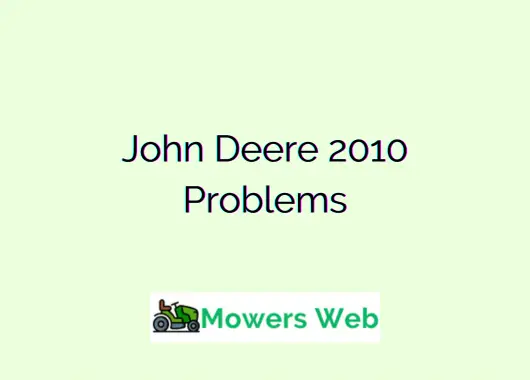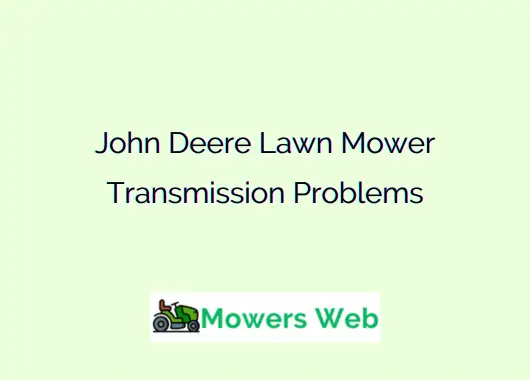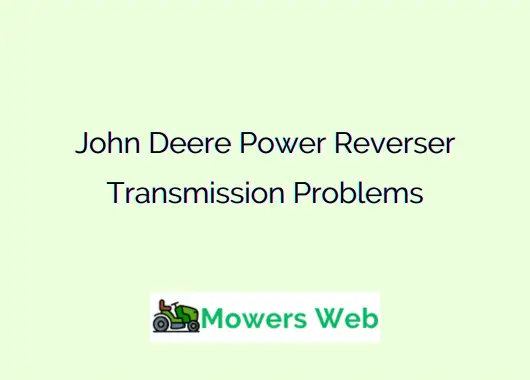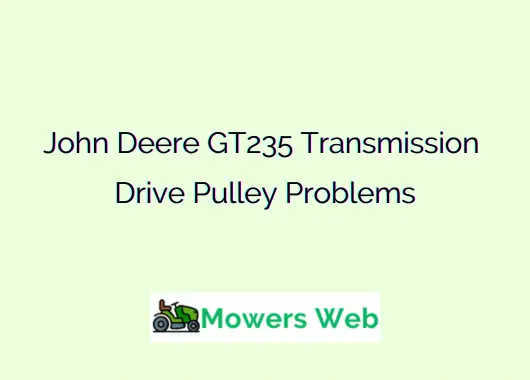The John Deere 2010 tractor is a reliable and versatile machine widely used in various agricultural and industrial applications.
However, like any piece of equipment, it may encounter problems over time. Understanding the common issues and how to troubleshoot them can help you keep your John Deere 2010 running smoothly and efficiently.
In this post, we will discuss the most common problems with John Deere 2010 and provide practical solutions to resolve them.
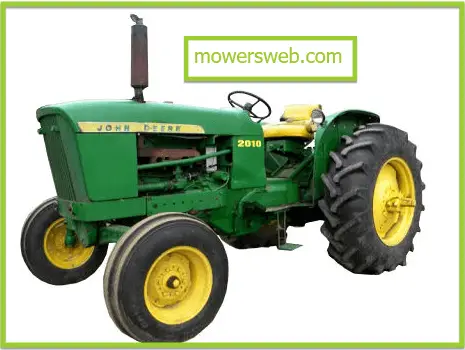
John Deere 2010 Problems
1. Engine Issues
One of the common problems faced by John Deere 2010 owners relates to engine performance.
Issues such as difficulty starting, rough idling, or loss of power can be attributed to various factors, including fuel system problems, ignition system faults, or worn-out components.
Regular maintenance, including fuel filter replacement, spark plug inspection, and valve adjustments, can help prevent and address these engine-related issues.
2. Transmission Problems
The transmission system is another area where problems may arise.
Symptoms of transmission issues include gear slipping, difficulty shifting, or unusual noises during operation.
Low transmission fluid levels, worn-out clutch components, or damaged gears can be the underlying causes.
Regular transmission fluid checks, clutch adjustments, and prompt repairs can help resolve these problems and prevent further damage.
Read John Deere Low Viscosity Hy-Gard Equivalent(9 Best)
3. Electrical System Malfunctions
Electrical system malfunctions can manifest as issues with starting the tractor, dim headlights, or non-functional gauges and switches.
Faulty wiring, loose connections, or a defective alternator can be to blame.
Thoroughly inspecting the electrical system, checking connections, and replacing faulty components can resolve these problems and ensure proper functioning.
4. Hydraulic System Troubles
As the hydraulic system is responsible for lifting and operating attachments, problems in this area can affect the tractor’s overall functionality.
Leaks, weak hydraulic pressure, or unresponsive controls can occur due to damaged hoses, worn-out seals, or a malfunctioning hydraulic pump.
Regular inspection, timely repairs, and proper hydraulic fluid maintenance can help keep the system in good working condition.
5. Steering and Brake Difficulties
Issues with steering and brakes can compromise safety and control.
Wear-out parts, misalignment, or issues with the hydraulic system are just a few of the causes of stiff or unresponsive steering, uneven tire wear, or ineffective braking.
Regular maintenance, including steering linkage lubrication, brake adjustments, and tire inspections, can help prevent these issues and ensure safe operation.
Read John Deere 1023E Problems(5 Quick Ways To Fix)
How to Fix John Deere 2010 Problems
1. Engine Troubleshooting
- Check the fuel system for any blockages or leaks.
- Inspect the air filter and replace it if necessary.
- Ensure the spark plugs are in good condition and properly gapped.
- Verify that the timing and valve clearances are within the recommended specifications.
- Monitor the engine temperature to prevent overheating issues.
Read 7 Toro V-Twin 708cc Engine Problems(With Solutions)
2. Transmission Diagnosis
- Check the transmission fluid level and condition.
- Inspect the clutch components for wear or damage.
- Examine the linkage and shift mechanisms for any misalignments.
- Listen for any unusual noises when shifting gears.
- Seek professional help if the issues persist or if major repairs are required.
3. Electrical System Inspection
- Inspect the battery terminals and clean them if corroded.
- Check the alternator’s output to ensure it is charging the battery correctly.
- Inspect the wiring harness for any frayed or damaged wires.
- Test the gauges, switches, and lights for proper functionality.
- Utilize a multimeter to measure electrical continuity and diagnose any issues.
4. Hydraulic System Checks
- Inspect the hydraulic fluid level and condition.
- Look for any visible leaks in the hoses or connections.
- Test the hydraulic controls for responsiveness and smooth operation.
- Verify the hydraulic pressure within the recommended range.
- Regularly replace hydraulic filters to prevent contaminants from damaging the system.
5. Steering and Brake Analysis
- Inspect the steering linkage and lubricate any grease fittings.
- Check the power steering fluid level and condition.
- Test the brakes for proper adjustment and responsiveness.
- Inspect the tires for signs of wear or damage.
- Address any misalignment issues promptly to prevent further damage.
Read 5 common John Deere 5045D Problems(With Solutions)
Maintenance Practices to Prevent Problems
To minimize the occurrence of problems with your John Deere 2010, it’s essential to follow regular maintenance practices.
Here are some preventive measures you can take:
Regular Fluid Checks and Changes
Regularly inspect and change the engine oil, transmission fluid, hydraulic fluid, and coolant according to the manufacturer’s recommendations.
Clean fluids help maintain proper lubrication and prevent contamination.
Proper Storage and Sheltering
Store your John Deere 2010 in a dry and sheltered area, such as a barn or shed, to protect it from the elements.
Exposure to moisture and extreme temperatures can accelerate wear and lead to problems.
Cleaning and Lubrication
Regularly clean your tractor, paying special attention to areas prone to dirt accumulation, such as the radiator and air intake.
Additionally, lubricate moving parts, such as the steering linkage and clutch pivot points, to ensure smooth operation.
Read Best Oil for John Deere Riding Mower(Top 3 Oils)
Inspection of Belts and Hoses
Inspect the belts and hoses for signs of wear, cracking, or fraying. Replace any damaged components promptly to avoid unexpected failures during operation.
Regular Filter Replacements
Replace the air, fuel, oil, and hydraulic filters at recommended intervals. Clean filters prevent contaminants from entering vital systems and causing damage.
Hiring a Professional for John Deere 2010 Repairs
While regular maintenance and troubleshooting can address many issues, some problems may require the expertise of a professional technician.
When seeking repairs for your John Deere 2010, consider the following:
Finding a Qualified Technician
Look for technicians with experience in servicing John Deere tractors. They should have knowledge of the specific model and access to proper diagnostic tools.
Authorized John Deere Service Centers
Consider taking your tractor to an authorized John Deere service center. These centers have access to genuine parts and are trained to perform repairs according to the manufacturer’s specifications.
Cost Considerations
Discuss the estimated costs of repairs with the technician or service center before proceeding. Evaluate the potential benefits and drawbacks of repair versus replacement for major issues.
Read John Deere 2305 Problems(7 Quick Ways To Fix)
FAQs
What are the most common engine problems on John Deere 2010 tractors?
Engine problems can include difficulty starting, loss of power, or rough idling.
Fuel system issues, ignition system flaws, or worn-out components are possible causes of these problems.
How can I diagnose transmission issues in my John Deere 2010?
Check the transmission fluid level and condition, inspect clutch components for wear or damage, and listen for unusual noises when shifting gears.
Seek professional help if issues persist.
What are some signs of electrical system malfunctions?
Signs of electrical system malfunctions include difficulty starting the tractor, dim headlights, or non-functional gauges and switches.
These problems can be caused by faulty wiring, loose connections, or a defective alternator.
How do I troubleshoot hydraulic system problems?
Inspect the hydraulic fluid level and condition, check for visible leaks, test the hydraulic controls for responsiveness, and verify hydraulic pressure within the recommended range.
What should I do if I experience steering or brake difficulties?
Inspect the steering linkage, check the power steering fluid level and condition, test the brakes for proper adjustment and responsiveness, and address any misalignment issues promptly.
What maintenance practices can help prevent John Deere 2010 problems?
Regularly check and change fluids, store the tractor in a sheltered area, clean and lubricate moving parts, inspect belts and hoses, and replace filters at recommended intervals.
How do I find a qualified technician for repairs?
Look for technicians with experience servicing John Deere tractors, consider authorized John Deere service centers, and discuss the estimated costs of repairs before proceeding.
Read 10 Common John Deere S240 Problems(With Solution)
Final Remarks
By understanding the common problems faced by John Deere 2010 tractor owners and following proper troubleshooting and maintenance practices, you can keep your tractor in excellent condition and minimize downtime.
Regular inspections, prompt repairs, and professional assistance, when needed, will ensure that your John Deere 2010 performs optimally and continues to be a reliable workhorse for your agricultural or industrial needs.

